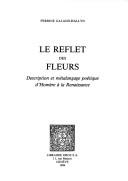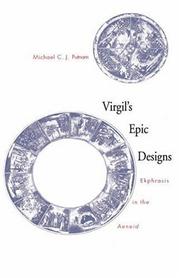| Listing 1 - 5 of 5 |
Sort by
|

ISBN: 3770804767 9783770804764 Year: 1972 Volume: Bd. 42 Publisher: Marburg Elwert
Abstract | Keywords | Export | Availability | Bookmark
 Loading...
Loading...Choose an application
- Reference Manager
- EndNote
- RefWorks (Direct export to RefWorks)
Poetry --- German literature --- Epic poetry, German --- German poetry --- Description (Rhetoric) --- Poésie épique allemande --- Poésie allemande --- Discours descriptif --- History and criticism --- Histoire et critique --- History --- History and criticism. --- Poésie épique allemande --- Poésie allemande --- Epic poetry, German - History and criticism --- German poetry - Middle High German, 1050-1500 - History and criticism --- Description (Rhetoric) - History - To 1500

ISBN: 2600000208 9782600000208 Year: 1994 Volume: 283 Publisher: Genève Droz
Abstract | Keywords | Export | Availability | Bookmark
 Loading...
Loading...Choose an application
- Reference Manager
- EndNote
- RefWorks (Direct export to RefWorks)
Literature --- anno 500-1499 --- Antiquity --- Beschrijving (Retorica) --- Description (Rhetoric) --- Description (Rhétorique) --- Metalanguage --- Metataal --- Métalangage --- Métalangue --- Description (Rhetoric). --- Metalanguage. --- Discours descriptif --- History --- 82.085.41 --- Second-order language --- Linguistic analysis (Linguistics) --- Descriptive writing --- Rhetoric --- Literaire metafoor. Beeldspraak --- 82.085.41 Literaire metafoor. Beeldspraak --- Métalangage --- Description (Literature) --- Description (Rhetoric) - History - To 1500. --- Description (Rhetoric) - History - 16th century. --- Description (rhétorique) --- Nature --- Poésie antique --- Poésie médiévale --- Poésie de la Renaissance --- Dans la littérature --- Histoire et critique
Book
ISBN: 0691042381 1322019584 9781400860487 1400860482 9780691042381 0691606919 9780691606910 Year: 2014 Publisher: Princeton, NJ
Abstract | Keywords | Export | Availability | Bookmark
 Loading...
Loading...Choose an application
- Reference Manager
- EndNote
- RefWorks (Direct export to RefWorks)
Using a reader-oriented approach, Shadi Bartsch reconsiders the role of detailed descriptive accounts in the ancient Greek novels of Heliodorus and Achilles Tatius and in so doing offers a new view of the genre itself. Bartsch demonstrates that these passages, often misunderstood as mere ornamental devices, form in fact an integral part of the narrative proper, working to activate the audience's awareness of the play of meaning in the story. As the crucial elements in the evolution of a relationship in which the author arouses and then undermines the expectations of his readership, these passages provide the key to a better understanding and interpretation of these two most sophisticated of the ancient Greek romances.In many works of the Second Sophistic, descriptions of visual conveyors of meaning--artworks and dreams--signaled the presence of a deeper meaning. This meaning was revealed in the texts themselves through an interpretation furnished by the author. The two novels at hand, however, manipulate this convention of hermeneutic description by playing upon their readers' expectations and luring them into the trap of incorrect exegesis. Employed for different ends in the context of each work, this process has similar implications in both for the relationship between reader and author as it arises out of the former's involvement with the text.Originally published in 1989.The Princeton Legacy Library uses the latest print-on-demand technology to again make available previously out-of-print books from the distinguished backlist of Princeton University Press. These editions preserve the original texts of these important books while presenting them in durable paperback and hardcover editions. The goal of the Princeton Legacy Library is to vastly increase access to the rich scholarly heritage found in the thousands of books published by Princeton University Press since its founding in 1905.
Description (Rhetoric) --- Greek fiction --- Reader-response criticism --- Rhetoric, Ancient. --- 875-31 --- 875 ACHILLES TATIUS --- 875 HELIODORUS EMESENUS --- Ancient rhetoric --- Classical languages --- Greek language --- Greek rhetoric --- Latin language --- Latin rhetoric --- Reader-oriented criticism --- Reception aesthetics --- Criticism --- Reading --- 875-31 Griekse literatuur: roman --- Griekse literatuur: roman --- 875 HELIODORUS EMESENUS Griekse literatuur--HELIODORUS EMESENUS --- Griekse literatuur--HELIODORUS EMESENUS --- 875 ACHILLES TATIUS Griekse literatuur--ACHILLES TATIUS --- Griekse literatuur--ACHILLES TATIUS --- History --- History and criticism --- Rhetoric --- Achilles Tatius. --- Heliodorus, --- Reader-response criticism. --- History and criticism. --- Romances [Greek ] --- Achilles Tatius --- Description (Literature) --- Rhetoric [Ancient ] --- Rhetoric, Ancient --- Achilles Tatius. -- Leucippe and Clitophon. --- Description (Rhetoric) -- History -- To 1500. --- Greek fiction -- History and criticism. --- Heliodorus, -- of Emesa. -- Aethiopica.
Book
ISBN: 3525251963 9783525251966 Year: 1992 Volume: 97 Publisher: Göttingen Vandenhoeck und Ruprecht
Abstract | Keywords | Export | Availability | Bookmark
 Loading...
Loading...Choose an application
- Reference Manager
- EndNote
- RefWorks (Direct export to RefWorks)
Body [Human ] in literature --- Caractères litteraires --- Caractères littéraires --- Character sketches--History and criticism --- Characterization (Literature) --- Characters [Literary ] --- Characters and characteristics in literature --- Corps humain dans la littérature --- Human body in literature --- Karakterisering (Literatuur) --- Karakters [Literaire ] --- Karakters in de literatuur --- Karakterschetsen in de literatuur --- Lichaam [Menselijk ] in de literatuur --- Literaire karakters --- Literaire portretten --- Literary characters --- Literary portraits --- Littérature--Personnages --- Menselijk lichaam in de literatuur --- Personages in de literatuur --- Personnages (littérature) --- Personnages littéraires --- Portraits [Literary ] --- Portraits littéraires --- Portretten [Literaire ] --- Types littéraires --- Homer --- Homer. --- Characters and characteristics in literature. --- Epic poetry, Greek --- Description (Rhetoric) --- Rhetoric, Ancient. --- History and criticism. --- History --- -Description (Rhetoric) --- Rhetoric, Ancient --- Classical languages --- Greek language --- Greek rhetoric --- Latin language --- Latin rhetoric --- Descriptive writing --- Rhetoric --- Greek epic poetry --- Epic poetry, Classical --- Greek poetry --- Character sketches --- Portraits, Literary --- History and criticism --- -Characters --- -Hóiméar --- Hūmīrūs --- Homeros --- Homerus --- Gomer --- Omir --- Omer --- Omero --- Ho-ma --- Homa --- Homérosz --- האמער --- הומירוס --- הומר --- הומרוס --- هومر --- هوميروس --- 荷马 --- Ὅμηρος --- Гамэр --- Hamėr --- Омир --- Homero --- 호메로스 --- Homerosŭ --- Homērs --- Homeras --- Хомер --- ホメーロス --- ホメロス --- Гомер --- Homeri --- Hema --- Pseudo-Homer --- Pseudo Omero --- Characters --- -Homer --- Homère --- Ancient rhetoric --- Characters. --- Technique --- Hóiméar --- Epic poetry, Greek - History and criticism. --- Description (Rhetoric) - History - To 1500.

ISBN: 0300073534 9780300073539 Year: 1998 Publisher: New Haven (Conn.): Yale university
Abstract | Keywords | Export | Availability | Bookmark
 Loading...
Loading...Choose an application
- Reference Manager
- EndNote
- RefWorks (Direct export to RefWorks)
Epic poetry, Latin --- Aeneas (Legendary character) in literature --- Description (Rhetoric) --- Rhetoric, Ancient --- History and criticism --- History --- Virgil --- Aeneas (Legendary character) in literature. --- Ekphrasis. --- Rhetoric, Ancient. --- History and criticism. --- Virgil. --- Technique. --- Ekphrasis --- Ancient rhetoric --- Classical languages --- Greek language --- Greek rhetoric --- Latin language --- Latin rhetoric --- Ecphrasis --- Art in literature --- Rhetoric --- Vergil --- Virgile --- Virgilio Máron, Publio --- Virgilius Maro, Publius --- Vergili Maronis, Publius --- Vergilius Maro, Publius --- Virgilius Maro, Publius, --- Virgilio Marone, P., --- Vergilīĭ, --- Virgile, --- Vergílio, --- Wergiliusz, --- Vergilīĭ Maron, P. --- Vergilīĭ Maron, Publīĭ, --- Verhiliĭ Maron, P., --- Vergil, --- Virgilio, --- Virgilīĭ, --- Virgilius Maro, P., --- Virgil Maro, P., --- ווירגיל, --- וירגיליוס, --- ורגיליוס, --- מרו, פובליוס ורגיליוס, --- فرجيل, --- Pseudo-Virgil, --- Pseudo Virgilio, --- Virgilio Marón, Publio, --- Bhārjila, --- Vergilius Maro, P. --- Vergilius --- Virgilio Marone, P. --- Vergilīĭ --- Vergílio --- Wergiliusz --- Vergilīĭ Maron, Publīĭ --- Verhiliĭ Maron, P. --- Virgilio --- Virgilius Maro, P. --- Virgil Maro, P. --- Pseudo-Virgil --- Pseudo Virgilio --- Virgilio Marón, Publio --- Bhārjila --- Marone, Publio Virgilio --- Epic poetry, Latin - History and criticism --- Description (Rhetoric) - History - To 1500 --- Virgil - Aeneis
| Listing 1 - 5 of 5 |
Sort by
|

 Search
Search Feedback
Feedback About UniCat
About UniCat  Help
Help News
News